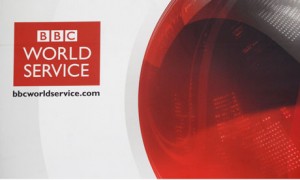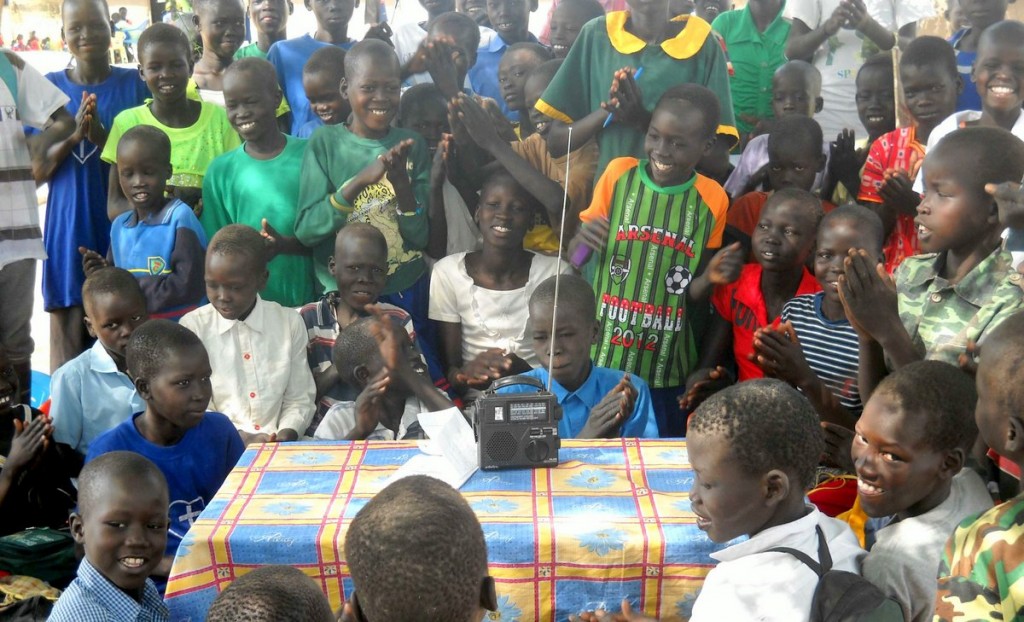 Many thanks to SWLing Post reader, Alex, who shares this essential listening: an audio report aired at 17:45 GMT today by Lucy Burton of the BBC World Service.
Many thanks to SWLing Post reader, Alex, who shares this essential listening: an audio report aired at 17:45 GMT today by Lucy Burton of the BBC World Service.
In this report, Burton discusses the future (or lack thereof) of shortwave radio. Burton interviews staff at Radio Romania International and even Glenn Hauser. To listen, just click:
The report reminds me that shortwave radio is often viewed as only legacy technology, when, in fact, shortwave has many advantages over digital options and is as relevant as ever.

This photo was taken in rural South Sudan, after Ears To Our World had distributed hundreds of radios via our partner Project Education South Sudan. This photo was taken prior to the recent outbreak of violence the country is currently enduring. Can you imagine the power of information just one radio can provide to a community during these turbulent times?
As I’ve mentioned before, Gareth Mitchell once interviewed me for the BBC World Service technology program Click. Mitchell’s interview focused specifically on my non-profit, Ears To Our World, which uses self-powered shortwave radios to further its mission. His description of our radios during his introduction was as insightful as it was humorous:
“…Portable battery powered devices that can stream audio in real time all via an intuitive touch interface.”
Aptly put. Shortwave radio, after all, has several profound benefits over the Internet, the three most significant being: 1) radio has no regard for national borders, and crosses them effortlessly; 2) listeners retain anonymity (thus cannot be readily tracked nor penalized by repressive authorities); and 3) radio requires no apps nor subscriptions to work. Nor even, for that matter, a power grid. It’s “just” an inexpensive “battery powered device” that can bring listeners vital lifesaving information, and, well…the world.
In short, I continue to stand by what I reported to UNESCO last year:
This post joins our popular tag: Why Shortwave Radio?

We place far too much reliance on modern technology based on the assumption that nothing will go wrong. In Australia they are about to end the ABC SW transmission. I guess the iPhone twitter twot generation is now charge. God help us all. This story won’t have a happy ending.
BBC, CRI, DW, VOA all these broadcasters and hundreds of other radio stations will continue on the shortwav waves for decades. Long live, SW!
Hi,
Ít´s amazing as you can with a cheap radio receiver can listen to several programmes like the BBC ones to Africa, The global catholic network here in Brazil, also Radio Ext Spain and the new shortwave giant Radio from China. Short wave should never be left behind there is many room for it. Live SW for ever and ever!
BBC has some good services and radio broadcasting is without any doubt great. I really thankful for the update it gives and delivers up to the far corner.
Well Robert Mugabe, the commie thug dictator of Zimbabwe must still think that shortwave radio can influence people – he just put forth a decree similar to one Hitler did in the late 1930s that makes it a capital offense to possess a radio capable of receiving shortwave broadcasting signals.
Excellent article Thomas! I am one with those that believe radios and shortwaves should be kept “alive” because it has so much and many benefits to the “world” listeners. I just learned of a recent statistic poll that still 7 out of 10 people are still listening to the radio. While it is true that listening on a portable radio running on batteries is very low cost, it can be very expensive to broadcast because of the cost of electricity. If there is a way to broadcast using “green” energy that is very cost effective, I think there would be many and much more shortwave broadcasters.
John
For as long as I remember people have been telling us that shortwave radio is history, how wrong they have been.
I got back into the hobby of shortwave DXing about six months ago, I had a break of about 10 years or so.
I half expected that major broadcasters would have pulled the plug or reduced their schedules and to be honest I could not care less, being a person that hunts low power long distance broadcasters I find I now get more enjoyment from the hobby with a lot less interference.
That plus the fact that some of the major broadcasters have vanished but other smaller broadcaters have filled the void makes the hobby more interesting.
I suppose when poorer third world countries catch up with technology that we take for granted that shortwave will slowly reduce, in the meantime we must remember that the vast amount of people living on this planet still need shortwave radio for news and entertainment.
This brings me to Digital Radio, I live in the city of Brisbane Australia and cannot recieve Digital Radio, I can listento shortwave from all corners of the world, give me shortwave anytime.
Dave
The BBC World service is an important media. If we are to continue telling the world through an agency (BBC) that is highly regarded throughout the world, then Short Wave transmissions have to remain.
There is the cost that has to be taken into account, Governments have to help, they will say there more cost effective media, but how do you get information to the middle of a sparsley populated area.
Governments around the world will cut of their nose’s to spite the ballance books. How many communities will become isolated.
Radio has opened up the world to remote area’s, countries gain friends through the education radio brings. eg. English is now spoken in countries where it isn’t the first and sometimes the second language, because of Short Wave Radio news and education programs.
When the majority of the world has access to the internet or has digital if not VHF radio, then we will be able to say, now is the time to consign Short Wave transmissions to the annals of History.
That time I regret to say, is a long way off.
JC
Dear Sir’s
I myself agree with the comments regards short wave as a media.
Third world countries would not have any info whats so ever if it was not for shortwave radio.
Most third world counties have no other means for obtaining information other than shortwave radio.
It is a shame that as new And faster technology becomes available, we seem to forget that not all is available to all.
Shortwave radio is still a life line to a lot off people this must always be in the back off everyones mind.
Kind regards
Gary